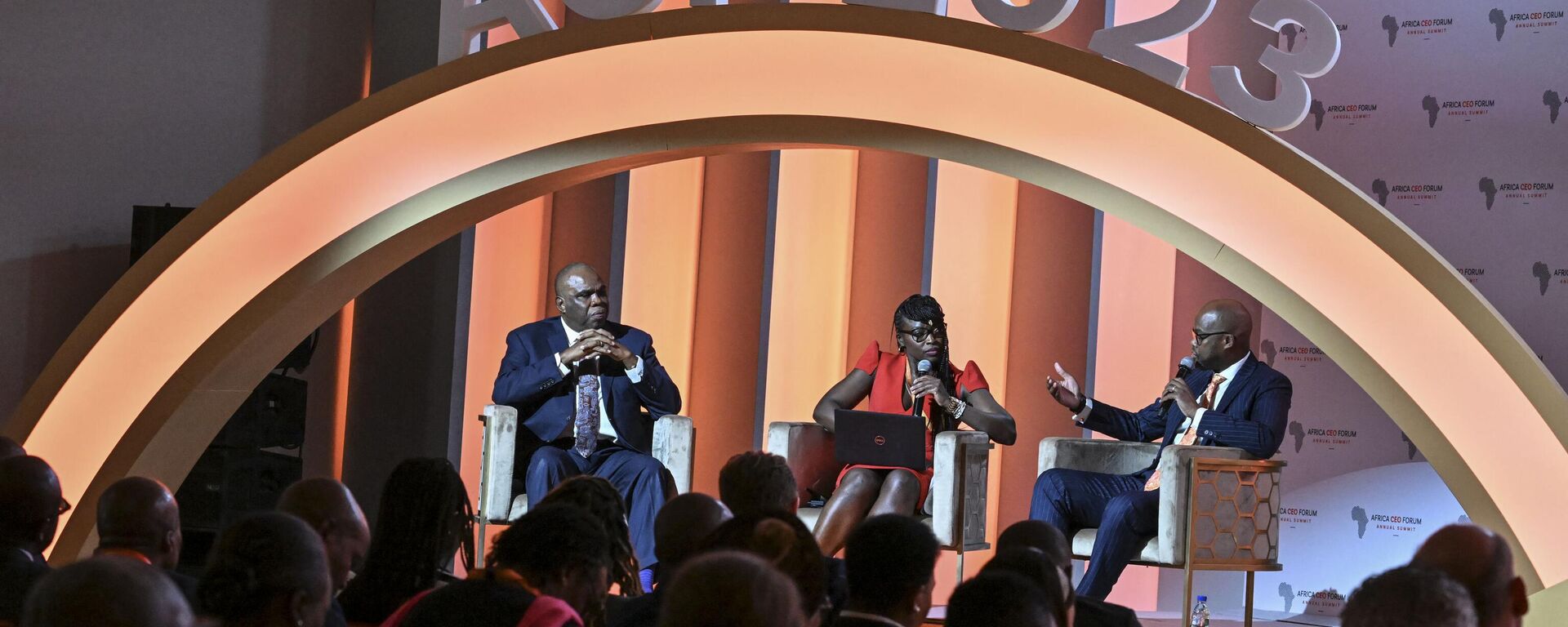https://en.sputniknews.africa/20240130/african-countries-can-save-5-billion-if-they-trade-in-their-own-currencies-sa-brics-sherpa-says-1064839724.html
Africa Can Save $5 Billion Annually If It Trades in Local Currencies, SA BRICS Sherpa Says
Africa Can Save $5 Billion Annually If It Trades in Local Currencies, SA BRICS Sherpa Says
Sputnik Africa
This year, as Russia takes over the chairmanship of the expanded BRICS group, with Egypt, Ethiopia, Iran, Saudi Arabia and the United Arab Emirates as the five... 30.01.2024, Sputnik Africa
2024-01-30T14:44+0100
2024-01-30T14:44+0100
2024-01-30T14:44+0100
opinion
russia
brics
south africa
brics expansion
brics summit
international
currency
alternative currency
ditching dollar
https://cdn1.img.sputniknews.africa/img/07e7/05/1d/1059553425_0:257:2731:1793_1920x0_80_0_0_1b1f4319b53500238cfdf9b92f51d130.jpg
African countries could save about $5 billion annually in financial transaction costs by trading in their own currencies, South Africa's BRICS Sherpa, Prof. Anil Sooklal, told Sputnik Africa. He noted that a global trend towards greater independence in trade can be observed not only in the BRICS countries, but also among developing countries in general, including in Africa.The South African diplomat added that the African Continental Free Trade Agreement and the Pan-African Payment and Settlement System are facilitating the use of local currencies within the African continent.He also noted that many African countries have turned to the BRICS New Development Bank (NDB), which announced last year that it had decided to allocate at least 30% of new borrowing to local currencies.Addressing the prospects of further BRICS expansion, Prof. Sooklal underscored the inclusive stance of the group's Johannesburg 2 declaration of 2023, which expressed a welcoming attitude towards new members and signalled a commitment to examine the issue of foreign participation in the BRICS framework.Emphasizing the commitment of the BRICS Leaders Council and foreign ministers, he alluded to the ongoing work aimed at developing modalities and presenting recommendations by the time of the upcoming BRICS summit in the Russian city of Kazan. Notably, African countries have displayed a considerable interest in forging closer ties with BRICS, with several nations, including Nigeria, Kenya, Ghana, Uganda, and Namibia, expressing their desire for a more integrated association with the grouping of the world's emerging economies, he noted.This enthusiasm reflects a positive sentiment towards BRICS within the African continent, compounded by the influence of the three full BRICS members from Africa – South Africa, Egypt and Ethiopia, according to Sooklal.
https://en.sputniknews.africa/20240128/guided-trade-initiative-plays-pivotal-role-in-achieving-afcftas-goals-sa-professor-says-1064815842.html
russia
south africa
egypt
Sputnik Africa
feedback@sputniknews.com
+74956456601
MIA „Rossiya Segodnya“
2024
Muhammad Nooh Osman
https://cdn1.img.sputniknews.africa/img/07e7/04/0a/1058467512_0:0:1280:1280_100x100_80_0_0_ec723833bcbfcaed2e21952965ad99e4.jpg
Muhammad Nooh Osman
https://cdn1.img.sputniknews.africa/img/07e7/04/0a/1058467512_0:0:1280:1280_100x100_80_0_0_ec723833bcbfcaed2e21952965ad99e4.jpg
News
en_EN
Sputnik Africa
feedback@sputniknews.com
+74956456601
MIA „Rossiya Segodnya“
Sputnik Africa
feedback@sputniknews.com
+74956456601
MIA „Rossiya Segodnya“
Muhammad Nooh Osman
https://cdn1.img.sputniknews.africa/img/07e7/04/0a/1058467512_0:0:1280:1280_100x100_80_0_0_ec723833bcbfcaed2e21952965ad99e4.jpg
russia, brics, south africa, brics expansion, brics summit, international, currency, alternative currency, ditching dollar, de-dollarization, anil sooklal, cyril ramaphosa, african union (au), egypt, trade, african continental free trade area (afcfta)
russia, brics, south africa, brics expansion, brics summit, international, currency, alternative currency, ditching dollar, de-dollarization, anil sooklal, cyril ramaphosa, african union (au), egypt, trade, african continental free trade area (afcfta)
Africa Can Save $5 Billion Annually If It Trades in Local Currencies, SA BRICS Sherpa Says
Muhammad Nooh Osman
Writer/Editor
This year, as Russia takes over the chairmanship of the expanded BRICS group, with Egypt, Ethiopia, Iran, Saudi Arabia and the United Arab Emirates as the five new members – the expansion of international trade in local currencies is one of the grouping's key agenda items.
African countries could save about $5 billion annually in financial transaction costs by trading in their own currencies, South Africa's BRICS Sherpa, Prof. Anil Sooklal, told Sputnik Africa. He noted that a global trend towards greater independence in trade can be observed not only in the BRICS countries, but also among developing countries in general, including in Africa.
The South African diplomat added that the African Continental Free Trade Agreement and the Pan-African Payment and Settlement System are facilitating the use of local currencies within the African continent.
"According to the African Union, if African countries trade in their own currencies, we will save something like 5 billion US dollars annually, in terms of financial transaction costs," Sooklal said. "That's why you see that some 20 plus countries, central banks, have now joined this Pan-African payment and settlement system as having greater independence in trading in their own currencies."
He also noted that many African countries have turned to the BRICS New Development Bank (NDB), which announced last year that it had decided to allocate at least 30% of new borrowing to local currencies.
"We can borrow in our local currency and don't have to borrow a foreign currency and be subject to all kinds of currency fluctuations where we lose out," Sooklal explained. "So this is a very important dimension of the work that will be taken forward under Russia's chairmanship [of the expanded BRICS], so that we can make recommendations to the leaders at the [BRICS] summit in Kazan, later this year."
Addressing the prospects of further BRICS
expansion, Prof. Sooklal underscored the inclusive stance of the group's Johannesburg 2 declaration of 2023, which expressed a welcoming attitude towards new members and signalled a commitment to examine the issue of foreign participation in the BRICS framework.
Emphasizing the commitment of the BRICS Leaders Council and foreign ministers, he alluded to the ongoing work aimed at developing modalities and presenting recommendations by the time of the upcoming
BRICS summit in the Russian city of Kazan.
"We are looking at the partner country status, and we hope that will complete that work and make recommendations of the countries that we believe should be invited to become partner countries because of the high level of interest in BRICS," the South Africa sherpa said.
Notably, African countries have displayed a considerable interest in forging closer ties with BRICS, with several nations,
including Nigeria, Kenya, Ghana, Uganda, and Namibia, expressing their desire for a more integrated association with the grouping of the world's emerging economies, he noted.
This enthusiasm reflects a positive sentiment towards BRICS within the African continent, compounded by the influence of the three full BRICS members from Africa – South Africa, Egypt and Ethiopia, according to Sooklal.
"I think also last year, when [South African] President Ramaphosa invited the entire African leadership to the BRICS outreach program, where you had all of the African countries sending delegations, either the level of head of state, head of government or senior ministers. That was clear information from the African continent that they believe in the leadership that BRICS has been providing, and that they would like to have closer relationships between Africa and BRICS," the diplomat concluded.



